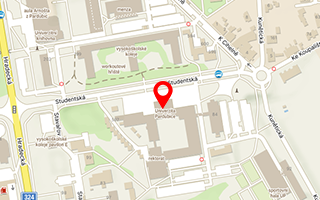Published: 26.03.2019
Two postgraduate students, Kateřina Šulcová (Pastirčáková) and Jaromír Šulc, have developed an algorithm that will save money of transport companies. Moreover, they successfully presented it at a conference in Orlando, USA.
Their algorithm helps to take managerial decisions to streamline internal processes, and it answers the question of what connections need to be taken out of service to save a vehicle, a driver, and thereby even the funds. "We can outsource the connection where it is more advantageous to pay to another transport company for kilometres so that we didn’t have additional costs on the driver, or it may be possible to put the connection completely out of operation while significantly reducing the operating costs," explains Jaromír Šulc.
The students of Faculty of Transport Engineering won an award for the best paper in the Computer Science and Engineering category of the 22nd World Multi-conference on Systemics, Cybernetics and Informatics. It is a multi-disciplinary conference divided into two main sections and conducted in English and Spanish, in which all thematic areas overlap.
“There were ten papers in our category. We managed to present our algorithm very well. Eventually, the reviewers appreciated our research as the best one,” recalls Kateřina Pastirčáková.
The award-winning paper, which has already been published in the Journal of Systemics, Cybernetics and Informatics, is a follow-up to research initiated in the 1980s when the theory of graphs began to be used for transport business planning tasks. Other approaches have been described over time using a variety of operational research methods and applied mathematics.
Better timetables
Jaromír Šulc also works with an algorithm for the automatic generation of notes. He started to cooperate with transport companies in Liberec, Plzeň and some other towns where the use of the algorithm appears to simplify the "production" of timetables. They thus become much clearer for passengers who read them more easily.
At the same time, there are other ways used abroad which streamline and optimize the scheduling system. It is just possible to use mathematical tools to automate the work. “In Hamburg, for example, only ten people do the entire planning process, which is the same number as in Ostrava, although Ostrava is several times smaller. We still have not learned to use mathematics as a tool in public transport that can make all people work more efficiently in our country. We have lost 30 years compared to other countries,” says Jaromír Šulc.
There are several important factors in the Czech and Slovak public transport systems that prevent the use of mathematical tools. In his dissertation, the Ph.D. student seeks to find ways to use individual algorithms to make even our operation more efficient. “However, the immunity of the Czech environment is very strong. Yet, for decades, all public transport algorithms have been used in practice from Germany across almost whole Europe, well beyond the Pond, as well as in Asian countries, Israel, and even in Russia. Only we are still defending what cannot be defended,” adds the Ph.D. student of Jan Perner Faculty of Transport.
Who is who
Ing. Kateřina Šulcová (Pastirčáková) received her Master's degree at CTU where she studied Mathematical Informatics at the Faculty of Nuclear Sciences and Physical Engineering. Currently, she is studying a combined programme of Technology and Management in Transport and Telecommunications: Technologies at Faculty of Transport Engineering. As part of her job at MSD, she dedicates herself to various optimization projects. Last year, she spent three months in Senegal where she was involved in identifying the causes of childbirth deaths and analysed the reasons for non-adherence to prenatal doctor visits.
Ing. Jaromír Šulc studied Transport Technology and Control at Jan Perner Faculty of Transport of the University in Pardubice. He is now a Ph.D. student at Faculty of Transport Engineering where he is studying Technology and Management in Transport and Telecommunications: Technologies. He cooperates with software companies operating in public transport and with transport companies in the Czech Republic which he provides with workflow algorithms and technologies that enable the enterprises to streamline their operations. In private, he is mainly in charge of the SW production and implementation at PTT Software for planning and evaluating the operation of the transport company.

